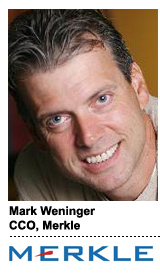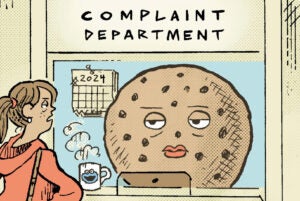 Mark Weninger, chief creative officer at Merkle, said there’s growing clamor outside of the creative fortress.
Mark Weninger, chief creative officer at Merkle, said there’s growing clamor outside of the creative fortress.
Taking the stage at Advertising Week on behalf of the customer relationship-marketing agency, he alluded to a force that’s “armed with zetabytes of numbers and analysis.” The new competitive differentiator in advertising is the person or platform that holds the data.
“We reach for hard metrics of performance and attribution,” he said. “As ad men and women, what were we expecting? Marketers have always sought to see better into their clients. The intrinsic appeal of big data should be pretty damn obvious to us. More facts and less fancy. We’re seeing advertising being remade and redefined.”
He told the intimate audience at the off-Broadway B.B. King’s Blues Club & Grill to think about Amazon and Netflix. Or Ancestry.com, which is “long streams of connected dots and Hadoop clusters.” There’s Gilt Groupe creating flash sales for you and you only, he said. These brands “are telling stories with data.” That, he added, is where database technology can connect with the creative to provide personalized experiences.
Weninger joined Merkle in 2010 from a post as managing partner and chief creative officer at OgilvyOne WorldWide in Minneapolis. Prior to that, he was an executive creative director at Wunderman/Young & Rubicam.
He sat down with AdExchanger behind the scenes at Ad Week.
AdExchanger: Where does CRM fit into agency workflow and skillset?
MARK WENINGER: The minute you say CRM, you begin in a very different place than traditional agencies have historically begun, so a lot of us grew up by putting our shovel in the ground with a brand. With a thought. With a concept. With a piece of imagination. And that was fine. The problem was, at some point, you need to bring it down and connect it with real people and real aspirations and real needs. A CRM-equipped kind of agency, or someone who thinks that way, thinks in a very different place. They wouldn’t think to start with ideas. Where they start is what they know. The real kind of human beings that drive a company’s business – what do we know about them? What motivates them and what do they aspire to? And, from there, we figure out, ‘How do we make that brand relevant to them?’ So the formula is completely reversed in a kind of CRM-enabled agency.
When you were with OgilvyOne before, did you use CRM yourself?
Well, I thought I had before I got to Merkle, and then I found out what the ‘professionals’ do, so to speak. [laughs] So, I think Ogilvy’s very smart and has always prided itself on the ability to wield a pretty smart brief, as it were. They’re masters at it. The difference, I think, is at a shop like Merkle, you have to wield your creative and your analytical skills equally well. It’s increasingly tough to prioritize one vs. the other. They both occupy a place of primacy in terms of how we approach our clients.
You talked IBM’s releasing its first interactive report in 1995. Now, they’ve launched a Digital Marketing Network and data-driven services players like SAP/Accenture, Cognizant, dunnhumby are aplenty. Then, there’s Merkle and Madison Avenue. Are you excited or terrified by the landscape?
I would say it’s a little bit of both. I would say it’s terrifying in the same way that the Super Bowl would be terrifying if you’re about to play in it. It’s the kind of terrifying that I think motivates you and keeps you fresh. I think there’s a temptation to look at advertising or marketing as monolithic and say it basically stayed the same from 1920 to 1990, when in fact it really didn’t. The advent of new media and massive brand saturation and television and direct-response marketing were all kind of interesting milestones along the line. This convergence of platforms and media and experiences is another step. Is it terrifying? It is. But I think you can approach it with a fair degree of certainty and confidence if you have the enabling structures to let you do it.
You talked about Amazon owning all that data “internally” that makes it a commerce powerhouse. On the client side, are you seeing more of a request to do more “in-house” and how’s that changing the dynamics of your conversation?
I’m not nearly part of every client conversation that’s going on at Merkle. However, it is increasingly unsurprising to find engagements that are designed to migrate the responsibility in-house. I’d say that in a fair number of engagements, what we’re asked to do is to design, develop and set into motion the infrastructure that clients can ultimately begin to assume themselves.
My sense is there will always be a role for an agency in a client’s marketing mix. I honestly don’t believe that any client, no matter its global footprint or how well resourced, is ever able to replicate the kind of core contribution of an agency, which is to offer something and say something that a client will not think of themselves. Regardless of whether you’re talking about CRM or the traditional kind of media contribution, an agency’s greatest win with a client is to help them imagine something they never thought possible. And, we heard during [the presentation] with Matt Moller of Samsung [director of digital] say today, ‘No one’s got the time or effort to devote to that kind of speculative thinking,’ which is why I think an agency steps up and says, ‘We’re going to usher you in to raw possibility.’”
The way you started the discussion — the ‘how would you [fit CRM into agency work]?’ — for me, I think the answer is a great technology platform can help deliver functionality. But I honestly think it’s the agency or idea or creative contribution that can deliver memorability. Like, when I saw this, encountered this, is it something that stays with me? I think technology can deliver something that is relevant. I think the more subjective contribution is something that is persuasive. I think relevance is no longer the benchmark. I think hyper-relevance is the benchmark. Is it persuasive, memorable, forwardable, sharable, clickable? Is it something that stays with me beyond the two-and-one-quarter fading encounter? It’s a tough challenge and it’s pretty daunting when you think about it.
Samsung mentioned this amalgamation of CRM email data, Omniture website data, DoubleClick data that’s becoming increasingly important on the agency side. Do creatives have to know data science?
One of the things my CEO told me early on in my tenure at Merkle was, ‘Mark, I expect someone with your background to change Merkle, but you need to expect that we’re going to change you.’ The expectation was there at the beginning that there would be this kind of convergence, to use your word. It’s tough. If you can think about creative people as businesspeople in jeans or technologists in jeans, that helps because, increasingly, that’s what we all are.
Big data the buzzword. As more agencies and marketing services providers claim to be data-driven, do you think anyone would actually claim that they’re not data-driven?
I think we’ve passed the threshold of buzzword with big data. Do I ever see anybody saying, ‘We’re not data-driven.’? At the moment, no. I think the difference is something you just said a moment ago, and you’re going to think this is a Merkle commercial and it’s really not. I’m way too tired to bullsh!t you here. If you want great work from an agency, look for a great culture in an agency. One of the things they beat into you early on at Merkle is you better be passionate, you better be intellectually curious about everything because it’s all going to be coming at you.
The folks who typically find a difficult rhythm at Merkle are kind of those folks who aren’t led to that kind of ‘oh my God’ moment. I think it has to do with more than managing the input load or process load that’s coming at us from a data perspective. Rather, taking a look at it and going, ‘I don’t know what I don’t know, so I’m going to bring in other hands here and together, we’re going to be passionate about this.’ It’s amazing to me how oftentimes I see agency culture playing itself out in the nature of their work, which is not the first thing most people would think.














